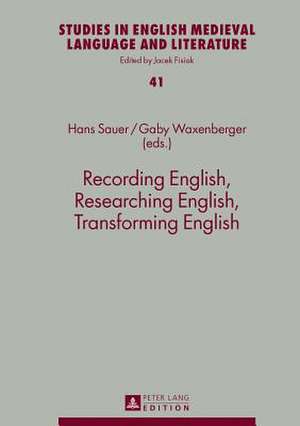Recording English, Researching English, Transforming English: Studies in English Medieval Language and Literature, cartea 41
Editat de Hans Sauer, Gaby Waxenbergeren Limba Engleză Hardback – 13 noi 2013
Din seria Studies in English Medieval Language and Literature
- 23%
 Preț: 490.05 lei
Preț: 490.05 lei - 23%
 Preț: 434.10 lei
Preț: 434.10 lei -
 Preț: 536.22 lei
Preț: 536.22 lei -
 Preț: 319.10 lei
Preț: 319.10 lei - 23%
 Preț: 492.25 lei
Preț: 492.25 lei - 5%
 Preț: 492.93 lei
Preț: 492.93 lei -
 Preț: 493.72 lei
Preț: 493.72 lei - 23%
 Preț: 478.36 lei
Preț: 478.36 lei - 23%
 Preț: 492.25 lei
Preț: 492.25 lei -
 Preț: 457.83 lei
Preț: 457.83 lei -
 Preț: 484.58 lei
Preț: 484.58 lei - 23%
 Preț: 465.40 lei
Preț: 465.40 lei - 23%
 Preț: 547.59 lei
Preț: 547.59 lei - 23%
 Preț: 660.18 lei
Preț: 660.18 lei - 23%
 Preț: 467.05 lei
Preț: 467.05 lei - 23%
 Preț: 548.18 lei
Preț: 548.18 lei - 23%
 Preț: 592.38 lei
Preț: 592.38 lei - 23%
 Preț: 466.90 lei
Preț: 466.90 lei - 9%
 Preț: 632.17 lei
Preț: 632.17 lei -
 Preț: 294.49 lei
Preț: 294.49 lei - 23%
 Preț: 586.47 lei
Preț: 586.47 lei - 9%
 Preț: 636.30 lei
Preț: 636.30 lei - 23%
 Preț: 546.84 lei
Preț: 546.84 lei - 8%
 Preț: 440.15 lei
Preț: 440.15 lei - 8%
 Preț: 467.12 lei
Preț: 467.12 lei -
 Preț: 425.16 lei
Preț: 425.16 lei - 8%
 Preț: 420.50 lei
Preț: 420.50 lei - 8%
 Preț: 489.52 lei
Preț: 489.52 lei -
 Preț: 405.84 lei
Preț: 405.84 lei -
 Preț: 389.42 lei
Preț: 389.42 lei - 23%
 Preț: 486.91 lei
Preț: 486.91 lei - 23%
 Preț: 531.28 lei
Preț: 531.28 lei - 8%
 Preț: 404.78 lei
Preț: 404.78 lei - 8%
 Preț: 529.78 lei
Preț: 529.78 lei - 23%
 Preț: 445.22 lei
Preț: 445.22 lei - 23%
 Preț: 584.39 lei
Preț: 584.39 lei - 23%
 Preț: 466.31 lei
Preț: 466.31 lei - 23%
 Preț: 434.40 lei
Preț: 434.40 lei - 23%
 Preț: 525.50 lei
Preț: 525.50 lei -
 Preț: 497.33 lei
Preț: 497.33 lei - 8%
 Preț: 401.91 lei
Preț: 401.91 lei -
 Preț: 356.36 lei
Preț: 356.36 lei -
 Preț: 356.59 lei
Preț: 356.59 lei - 7%
 Preț: 261.40 lei
Preț: 261.40 lei - 21%
 Preț: 370.79 lei
Preț: 370.79 lei -

Preț: 622.79 lei
Preț vechi: 808.82 lei
-23% Nou
Puncte Express: 934
Preț estimativ în valută:
119.17€ • 124.74$ • 99.19£
119.17€ • 124.74$ • 99.19£
Carte tipărită la comandă
Livrare economică 31 martie-14 aprilie
Preluare comenzi: 021 569.72.76
Specificații
ISBN-13: 9783631642238
ISBN-10: 3631642237
Pagini: 345
Ilustrații: illustrations
Dimensiuni: 154 x 216 x 28 mm
Greutate: 0.75 kg
Editura: Peter Lang Gmbh, Internationaler Verlag Der W
Seria Studies in English Medieval Language and Literature
ISBN-10: 3631642237
Pagini: 345
Ilustrații: illustrations
Dimensiuni: 154 x 216 x 28 mm
Greutate: 0.75 kg
Editura: Peter Lang Gmbh, Internationaler Verlag Der W
Seria Studies in English Medieval Language and Literature
Notă biografică
Hans Sauer is Professor Emeritus at Ludwig-Maximilians-University Munich. His research interests include Medieval English texts, word-formation, lexicography, plant names, Beowulf, the history of linguistics and varieties of English. Gaby Waxenberger is Associate Professor at LMU Munich and is specialized in Old and Middle English, Old English Runology and varieties of English.
Cuprins
Contents: Trinidad Guzmán-González: Homo loquens, homo scribens: On the role of writing in language change, with special reference to English - Gaby Waxenberger: The reflection of pre-Old English sound changes in pre-Old English runic inscriptions - Jerzy Welna: Middle English evidence of the elimination of velar fricatives: A prose corpus study - Carla Morini: The chain-mail coat terminology in Old-English and the dating of Beowulf - Kousuke Kaita: Old English geweald habban/agan as a stylistic set phrase, compared with Old High German and Old Saxon cognates - Annette Mantlik: An etymological analysis of shell nouns - Nadĕzda Kudrnácová: Secondary agent constructions from a diachronic perspective - Mary Blockley: Connectives before Chaucer: Conjunctive for and its competition in Early Middle English - Yuko Higashiizumi: A history of Because-clauses and the coordination-subordination dichotomy - Christina Suárez Gómez: The replacement of e by at in the history of English - Fuyo Osawa: Impersonal and passive constructions from a view-point of functional category emergence - Maria F. Garcia-Bermejo Giner: The southern dialect in Thomas Churchyard¿s The Contention bettwixte Churchyearde and Camell (1552) - Julia Fernández Cuesta/Christopher Langmuir: Scoto-Cumbrian? The representation of dialect in the works of Josiah Relph and Susanna Blamire - John Insley: J. R: R: Tolkien and the historical study of English - Stella Wang: Cinese translations of Beowulf.



